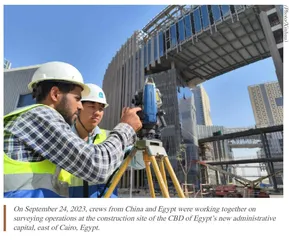Jointly Building a High-level China-Africa Community with a Shared Future in the Process of Advancing Multipolarity
作者: Yu Jiang

In today’s world, the changes unseen in a century is evolving at a faster pace and the world landscape is undergoing an era of major developments, transformation and adjustment marked by increasing instability and uncertainties. In the meantime, the historical trends of peace, development, cooperation and mutual benefit are unstoppable, representing where global opinion trends and the arc of history bends to lead humanity to a bright future. It is pointed out at the Central Conference on Work Relating to Foreign Affairs convened at the end of December 2023 that the world has entered a new period of turbulence and transformation, but the overall direction of human development and progress will not change, the overall dynamics of world history moving forward amid twists and turns will not change, and the overall trend toward a shared future for the international community will not change. Forming a correct perception of Africa’s development trend is a key component of comprehensively understanding and properly handling the international situation and also a necessary prerequisite for continuously deepening China-Africa relations.
Africa is Becoming an Important Pole with Global Influence
General Secretary Xi Jinping emphasized at the Central Conference on Work Relating to Foreign Affairs in June 2018 that with the correct historical perspective, one will not only notice the current international situation, but also review the past and observe the world through the prism of historical laws, and look ahead and detect the underlying trends of historical progress. Historically, the Bandung Conference in 1955 not only championed the “Bandung Spirit” advocating anti-imperialism and anti-colonialism efforts, striving for national independence and jointly maintaining world peace, but also pushed forward the national independence movement in Africa. After over six-decade arduous exploration, the cause of Africa’s integration and modernization is embracing bright prospects. Over the past 60 years, Africa, as a continent, has gradually rooted out the legacy of colonialism and achieved leapfrog socioeconomic transformation, which laid a foundation for independent development. And African countries have steadily improved governance capabilities, significantly enhanced political autonomy and further developed awareness to protect their own rights. Africa has attempted to get rid of the colonial shackles on their culture and gradually established and consolidated the consciousness of nation-state. Under the banner of Pan-Africanism, African countries have strived forward along the modernization path featuring independence, seeking strength through solidarity and integration, demonstrating African power in the struggle to uphold multilateralism and safeguard the common interests of developing countries. The African Union (AU) is steadily advancing the Agenda 2063 and the African Continental Free Trade Area (AfCFTA) has been officially launched, both witnessing intensified coordination among sub-regional organizations.
Africa is facing multiple difficulties and challenges, but also embracing the positive trend of development, revitalization and strength through solidarity. From a realistic point of view, Africa’s ongoing socioeconomic predicament has shown a promising trend of rebounding after hitting the bottom. According to the World Economic Outlook released by the International Monetary Fund (IMF) in October 2023, in sub-Saharan Africa, growth is projected to pick up to 4% in 2024. In terms of current account balance and public debt, there is also strong projection of bottoming out. According to data from the IMF, the fiscal deficit in sub-Saharan Africa accounted for 4.2% of GDP in 2023, a significant improvement from 6.5% in 2020, and is projected to further drop to 3.7% in 2024. Further analysis shows that in 2023, the debt-to-GDP ratio of middle-income African economies was higher than that of low-income economies, fully demonstrating that the highly-indebted countries are capable of seeking development supported by debts. In terms of attracting international investment, in 2022, the FDI inflow into Africa reached 45 billion US dollars. The number of greenfield projects increased by 39% to 766. Out of the world’s 15 largest greenfield investment projects, six are located in Africa, with each valued at over 10 billion US dollars. Though in the face of uncertainties, the African economy boasts rare resilience in the context of the sluggish recovery of the world economy.
The China’s Africa Policy Paper released in 2015 points out that Africa has become one of the continents with the fastest economic growth and greatest development potential. It is an important player on the stage of world politics, a new growth pole for the global economy and a center of human civilization with diverse cultures. Africa is becoming a key force pushing forward the reform of the international system and the evolution of world order. In June 2023, a delegation, consisting of leaders and senior officials from seven African countries, respectively met with Ukrainian President Volodymyr Zelensky and Russian President Vladimir Putin, offering a 10-point peace proposal to settle the conflicts. The efforts made by African countries to promote ceasefire between Russia and Ukraine were highly commended. Their independent mediation efforts without the engagement of the United States present Africa as an important force in the international arena and further contribute to a multi-polar world. In August 2023, South Africa hosted a high-level BRICS Summit to welcome African countries such as Egypt and Ethiopia as new members, marking a historical milestone of the BRICS cooperation mechanism. On January 1, 2024, the BRICS members officially expanded to ten, conforming to the historical trend of an unfolding multipolar world and fully demonstrating the promising future of BRICS cooperation. Among its ten member countries, three are African countries, suggesting further African weight in the BRICS. This expansion has opened a new era of “Global South” efforts to seek strength through solidarity.